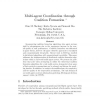50 search results - page 9 / 10 » A Game Theoretic Approach to Quantum Information |
CHI
2010
ACM
15 years 6 months ago
2010
ACM
Adaptability to the needs of end-users has been identified as a key requirement for technologies designed to support mental health interventions. The PlayWrite system allows end u...
107
click to vote
AAAI
2008
15 years 1 months ago
2008
This paper examines, by argument, the dynamics of sequences of behavioural choices made, when non-cooperative restricted-memory agents learn in partially observable stochastic gam...
125
click to vote
GAMESEC
2010
14 years 9 months ago
2010
The combination of username and password is widely used as a human authentication mechanism on the Web. Despite this universal adoption and despite their long tradition, password s...
116
click to vote
ATAL
1997
Springer
15 years 3 months ago
1997
Springer
Incorporating coalition formation algorithms into agent systems shall be advantageous due to the consequent increase in the overall quality of task performance. Coalition formatio...
SOFSEM
2009
Springer
15 years 8 months ago
2009
Springer
Abstract. Computational mechanism design (CMD) seeks to understand how to design game forms that induce desirable outcomes in multiagent systems despite private information, self-i...

